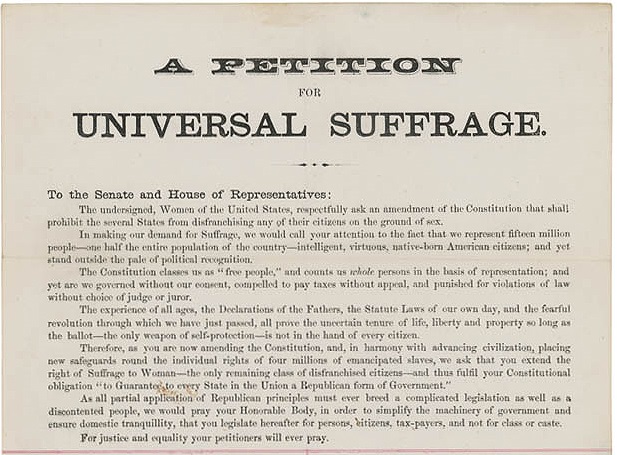A Petition For Universal Suffrage and Women's Rights after the Civil War
Much has been made of the divide between anti-slavery and pro-women's-rights activists in the aftermath of the Civil War. Then, even more than now, intersectionality was difficult. There was, at the time, no conception of it, no words and phrases that--however ignored at times--were at least honored in spirit. But the same struggles over whose need is most pressing animate modern struggles over women's rights, racial equality, sexual rights, the plights of trans people, the oppression of the poor, and countless other pressing problems in our modern society.
It wasn't so different then. This petition above exists in context of slavery. "You are... advancing civilizations, placing new safeguards round the individual rights of four millions of emancipated slaves, we ask...extend the right of Suffrage to Women--the only remaining class of disfranchised citizens."
Women and slaves are compared, and the freedom of one justifies the freedom of the other. Women were classified as free people, yet lacked many of the rights citizens had. These protests, and these petitions, at first blush (and ultimately even to the last) don't seem all that problematic. And by themselves, they weren't. It was accurate to say that hypocrisy was rank in the way that black male and female suffrage were retreated in the later 1860s.
But feminists such as Elizabeth Cady Stanton protested against African-Americans being given the vote if good white women, far more civilized, weren't. For her, women's rights and the woman's vote had to come first or with the African-American vote.
Lori Ginsburg has a fascinating lecture on Stanton which highlights the difficulties of her position and claims, and goes over the meaning of her life to modern feminism: https://vimeo.com/65680765
While her position was not universally adopted, it was not entirely unique, and her belief in racial superiority--and that once freed, and maybe also given the vote, the mission was accomplished, nothing more needed to be done for slaves--would haunt the movement in some ways for well over a century.
Women did not get the vote, this petition or no. African-Americans, despite their own efforts and those of northern allies, found their gains reversed in the 1870s, 80s, and 90s, and faced as well constant threat of violence and even rape.
Which is the topic of the next post! Rape Culture In the Post-Bellum American South.
Much has been made of the divide between anti-slavery and pro-women's-rights activists in the aftermath of the Civil War. Then, even more than now, intersectionality was difficult. There was, at the time, no conception of it, no words and phrases that--however ignored at times--were at least honored in spirit. But the same struggles over whose need is most pressing animate modern struggles over women's rights, racial equality, sexual rights, the plights of trans people, the oppression of the poor, and countless other pressing problems in our modern society.
It wasn't so different then. This petition above exists in context of slavery. "You are... advancing civilizations, placing new safeguards round the individual rights of four millions of emancipated slaves, we ask...extend the right of Suffrage to Women--the only remaining class of disfranchised citizens."
Women and slaves are compared, and the freedom of one justifies the freedom of the other. Women were classified as free people, yet lacked many of the rights citizens had. These protests, and these petitions, at first blush (and ultimately even to the last) don't seem all that problematic. And by themselves, they weren't. It was accurate to say that hypocrisy was rank in the way that black male and female suffrage were retreated in the later 1860s.
But feminists such as Elizabeth Cady Stanton protested against African-Americans being given the vote if good white women, far more civilized, weren't. For her, women's rights and the woman's vote had to come first or with the African-American vote.
Lori Ginsburg has a fascinating lecture on Stanton which highlights the difficulties of her position and claims, and goes over the meaning of her life to modern feminism: https://vimeo.com/65680765
While her position was not universally adopted, it was not entirely unique, and her belief in racial superiority--and that once freed, and maybe also given the vote, the mission was accomplished, nothing more needed to be done for slaves--would haunt the movement in some ways for well over a century.
Women did not get the vote, this petition or no. African-Americans, despite their own efforts and those of northern allies, found their gains reversed in the 1870s, 80s, and 90s, and faced as well constant threat of violence and even rape.
Which is the topic of the next post! Rape Culture In the Post-Bellum American South.

Comments
Post a Comment